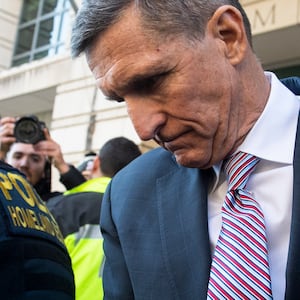Just after the prosecutor assigned to the case resigned on Thursday, the Department of Justice announced that it dropped the charges against Michael Flynn, the former national security advisor who’d already pleaded guilty to lying to the FBI about his contacts with Russia.
President Trump forecast this before it happened. Last week, he insisted that Flynn had been exonerated. Apparently referring to his pardon power, Trump suggested that if the court did not do something he would use “a different kind of power.”
And now it’s happened. While the president has the broad power to pardon, he should not control individual prosecutorial decisions, especially those concerning a political ally. It is extremely unusual for the government to dismiss charges after a guilty plea. This is a sign that the historic independence of the Justice Department has been compromised.
ADVERTISEMENT
Even if Trump did not have a direct hand in the decision to dismiss the case, his comments alone, announcing his desired outcome, seriously compromised the traditional and fundamental wall between law enforcement decisions and partisan politics.
Trump has repeatedly tried to cast the FBI and DOJ as villains—deep state Dems in disguise, who are seeking in an irrational fury to undermine him and his administration. He has called cooperators “rats” and FBI agents “human scum.” He put the word justice in the Department of Justice in scare quotes! That’s not to mention the insults he reserved for the Mueller investigation, “a rigged witch hunt” conducted by “angry democrats.” None of these insults were in context of general federal criminal law enforcement. They were all directed at those within DOJ who have tried to hold him and his allies responsible for their acts.
But, it seems, this was not just rhetoric. The DOJ has begun to effect his will by chipping away at the legitimacy of the Mueller investigation as well as the prosecutions of Trump’s allies that emerged from it. Just months ago, four career prosecutors resigned after DOJ overrode their sentencing recommendation in the Roger Stone prosecution. DOJ veterans from Republican and Democratic administrations were stunned by this unprecedented reversal and suspected that improper political considerations had infiltrated the purportedly neutral agency.
It is now up to Judge Emmet G. Sullivan, who accepted Flynn’s guilty plea, to decide whether to dismiss the case. He could ask for submissions and hold public hearings, which might make the government’s internal decision more transparent. The court could also offer its opinion on whether DOJ engaged in any impropriety in the case.
Of course, the Department of Justice should drop a prosecution, even after a guilty plea, if it were the product of corruption, or if, as Trump claims, the defendant had been exonerated. But neither of these is the case. The facts are clear. The FBI did its job properly and Michael Flynn committed a crime.
Last week, new documents revealed that an FBI agent entertained the possibility of getting Flynn to lie so the government could prosecute him or get him fired. This prompted Flynn to move to withdraw his guilty plea based on the supposed FBI misconduct, and Trump to proclaim that his friend and ally had been cleared. Flynn argued that law enforcement improperly lured him into a perjury trap. Prosecutors are familiar with this sort of objection. Defendants often insist that they’ve been treated poorly, unfairly entrapped, or subjected to misconduct. But rarely do they get the president, or anyone else in power for that matter, to echo their complaint.
The problem with Trump’s assertion is that what happened to Flynn was not corrupt. It was not even unusual. It happens to countless Americans, those suspected of organized crime, drug dealing, white-collar crime, or other offenses. There is nothing wrong with a president seeking to reform DOJ practices, or recommending new policies for the FBI, but by singling out an accepted law enforcement practice only when it is targeted at his ally, Trump is patently advocating one set of rules for his friends and another for everyone else. The risk of this sort of corruption is precisely why career prosecutors, not politicians or political appointees, make decisions in individual prosecutions. This is particularly important in a case like this where the risk of corrupt influence was so great that then-Deputy Attorney General Rod Rosenstein saw fit to appoint a special prosecutor.
Flynn’s legal argument lacks merit and Judge Sullivan would certainly have dismissed his plea. The documents taken together show that the government was not engaged in misconduct. Instead they reveal that the FBI had ample evidence prior to that interview that Flynn had violated the law. In a standard practice, the agents debated amongst themselves whether to tell Flynn how much they knew prior to the interview or just wait to see what he had to say.
In these types of interviews, government agents have no legal obligation to show their hand. The FBI is permitted to ask questions even if it suspects the target will lie, as long as it has reason to believe that the person was involved in or witness to some underlying criminal conduct. In other words, the FBI is not allowed to ask someone if he cheated on his wife just to catch him and prosecute him for that lie. But agents are permitted to ask questions if they have a legitimate law enforcement purpose in doing so. And if the person they are interviewing lies, well that’s on him.
Flynn’s claim that he was entrapped – and Trump’s implicit endorsement of that claim – is equally flawed. Law enforcement is allowed to and frequently does lead someone do something that he was inclined to do anyway. In other words, an agent cannot offer a random individual a million dollars to mug an old woman and jail him for doing so but he can provide the opportunity or means to accomplish a crime that the individual was predisposed to commit. The agents did not do anything to induce Flynn to lie. And given that Flynn had already lied to the press about his contacts with Russia, it was certainly reasonable for them to suspect he might lie to them as well.
The FBI in this case had a legitimate purpose. It was seeking to uncover Russian efforts to interfere in the 2016 election. In doing so, it found that then National Security Advisor Michael Flynn had extensive contacts with Russian individuals and diplomats during the campaign, a potential violation of the Logan Act, a law that bars private individuals from conducting foreign policy. While it’s true that Justice’s inspector general uncovered serious problems in the conduct of this investigation, the report also affirmed its basic legitimacy. And even if the investigation were corrupt, a witness is still not allowed to lie. Flynn swore in open court to his criminal conduct. While a defendant can on rare occasions of extreme injustice withdraw a guilty plea, generally, there are no backsies.
So, this case was business as usual for the FBI. That brings us to the Justice Department’s decision. If the FBI did nothing wrong, why did it reverse its previous decision to prosecute Flynn? The answer is clear. Because that is what the president wanted. In case there were any doubt about this, the fact that the career prosecutor withdrew after DOJ’s decision to drop the charges telegraphs that DOJ was affected by the president’s wishes.
The president’s pardon power is broad and he can use it for no reason or even a suspect one. If Trump had pardoned Flynn, he would have faced political repercussions. But when the DOJ acts, it appears as if it is acting neutrally. Here that is not the case. Thus a partisan decision is masked as a professional one. A personal favor to a friend masquerades as justice, making it harder to hold the president accountable for this act.
We should see this for what it is – a further attempt to deflect blame from himself and his allies to hard working career officials in the US government. The most troubling part of it is that Trump seems to have managed to drag the justice department down with him. Rather than adhering to long standing policy and practice, the DOJ has done the president’s bidding while simultaneously giving him the cover of a respected and supposedly neutral agency.







